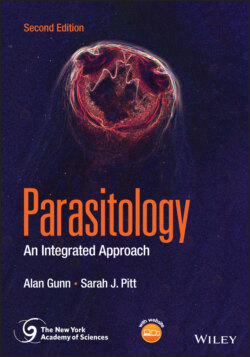Читать книгу Parasitology - Alan Gunn - Страница 72
How Malaria Has Influenced the Course of History
ОглавлениеMalaria has influenced the course of history for thousands of years and remains relevant today. The distinctive symptoms of chronic and repeated infections of malaria can be identified with almost complete certainty from historical descriptions from ancient civilisations of Egypt, Sumeria, China, and India. For example, a Chinese medical text, the Nei Cheng, written in approximately 2700 BC refers to epidemics of the ‘Mother of Fevers’ that is undoubtedly malaria. The authors describe the cyclical fevers and an enlarged spleen that are features of malaria. Similarly, the symptoms of malaria can be identified from the writings of Hippocrates in Ancient Greece (~500 BC). Some authors have suggested that the decline of the Ancient Greek and Roman civilisations was associated with effects of malaria epidemics (Poser and Bruyn 1999). More recently, during WW2, an outbreak of malaria among allied troops in 1943 seriously compromised their attempts to invade Sicily. American troops suffered similar problems with malaria during the Vietnam war in the 1960s. Although malaria caused only about 0.2% of fatalities among the American troops, the debilitating effects reduced the combat strength of some units by up to 50%. The Viet Cong were aware of the problems that malaria caused the American troops and intentionally sabotaged local mosquito and malaria control programmes. They were successful in undermining malaria control over large areas, but consequently the combat strength of their own troops was also severely compromised (Drisdelle 2011).
Today, malaria is considered a tropical disease, but it was once a common disease in many of the temperate regions of the world. Malaria was a major cause of mortality in parts of Italy and Greece as late as the 1920s (Snowdon 2006). Malaria existed in the United Kingdom until the early years of the twentieth century, particularly in the fenland regions (Reiter 2000). The potentially fatal consequences of the ague are alluded to in works by Geoffrey Chaucer (c1343–1400) and William Shakespeare (1564–1616), so the disease was obviously common enough for their audiences to be familiar with it. Samuel Pepys (1633–1703) describes suffering from the ague in his diaries and historical accounts state that Oliver Cromwell (1599–1658) died from an attack of the ‘tertian ague’.
